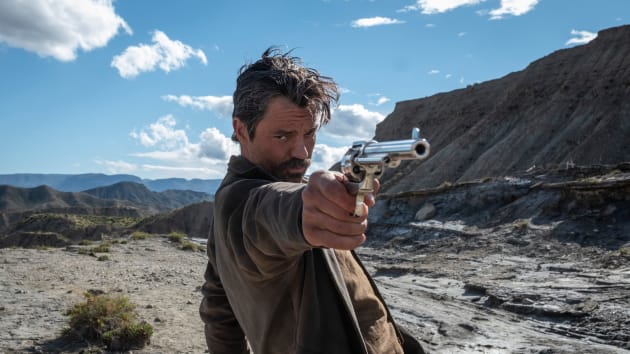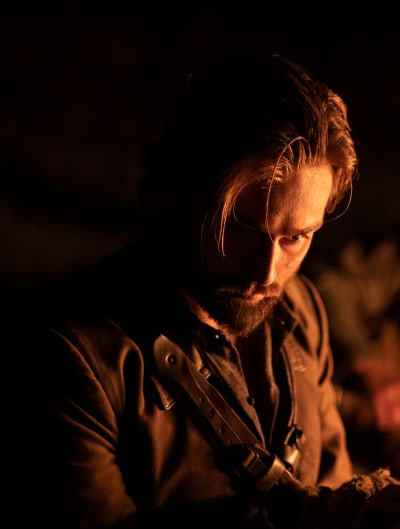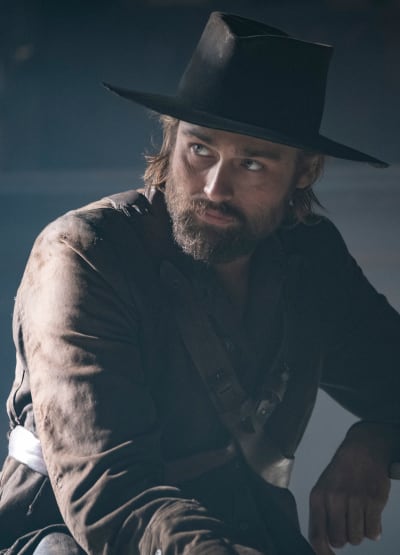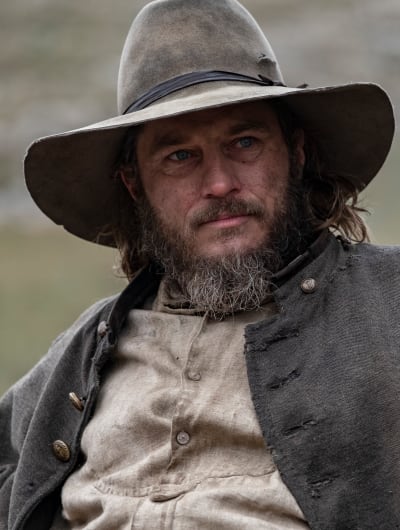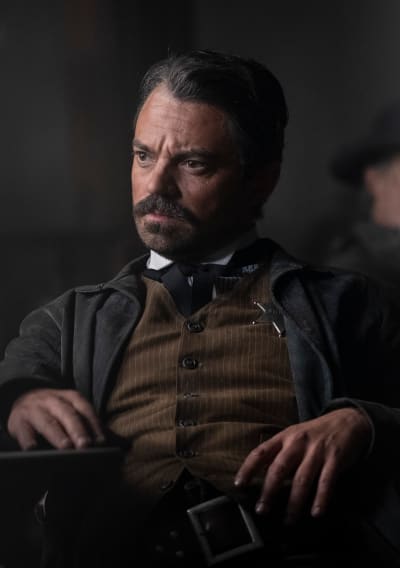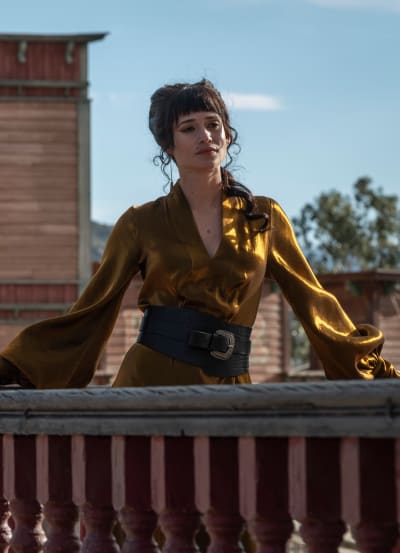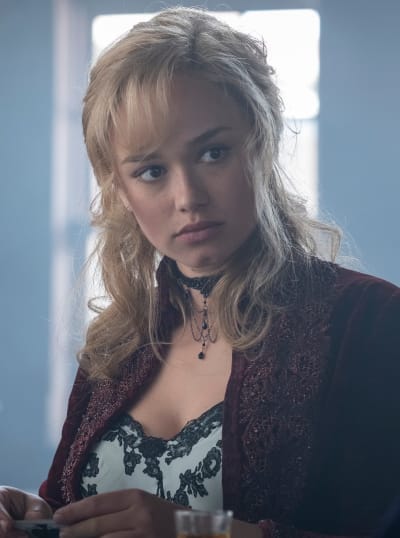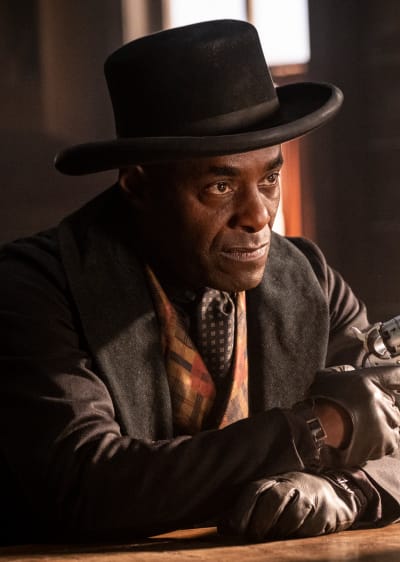That Dirty Black Bag premiered on AMC+ on March 10, 2022, and ran until with a season of eight episodes. July 26, 2022, marks the release of Season 1 on DVD and Blu-Ray.
Mauro Aragoni, Silvia Ebruel, and Marcello Izzo have created a faithful homage to the Spaghetti Westerns of Sergio Leone.
Though it will no doubt draw comparisons to Deadwood (that other popular Western television series), tonally, they feel very different.
That Dirty Black Bag borrows as much from the gore/horror genre as any type of Western — spaghetti, revisionist, or otherwise.
An underlying plot centers around a mysterious cult that requires human sacrifice, with one such devotee having a literal mountain of skulls in his backyard.
Brian O’Malley and Mauro Aragoni take turns directing each of the season’s eight episodes with craftsmanlike attention to detail, but the most magnificent work comes courtesy of cinematographer P.J. Dillon.
The vistas of Spain, the Sahara Desert, and Italy are stunning and evocative. The land is a character all on its own — the most ruthless of them all.
Another stunning element of this show is Mick Giacchino’s music. Again, it’s all very much an homage (some could say derivative) of Ennio Morricone’s (frequent collaborator of Sergio Leone) scores.
The flute, the ocarina, the drums, all of it — it’s one of the most enjoyable aspects of the show, elevating the atmosphere and tying it all together.
The music informs us how the characters feel and how we should feel about them.
Acting-wise, this cast has charisma to spare. None of the men are particularly likable, but they are mostly compelling and layered.
Douglas Booth is practically unrecognizable as gruff bounty hunter Red Bill. With a gravelley voice and a layer of filth, Booth carries Bill’s trauma close to his chest, only releasing it when it’s time to destroy the monsters he encounters.
It’s worth noting, too, that the actor who plays Bill as a teen, Francesco Piacentini-Smith is also impeccably cast.
Not only do the two actors bear a striking resemblance to one another, but Piancenti-Smith more than holds his own in Bill’s origin episode, alongside Travis Fimmel as Anderson.
Dominic Cooper has the swagger of a small-town sheriff down, but there’s a depth behind his eyes that, as revelations are made with each passing episode, make sense and show how many layers he’s got under the surface.
The back and forth between Bill and McCoy was always compelling. It’s less cat and mouse and more like two wild dogs going after each other.
The final Mexican standoff “duel” in Episode 8 was so on point, down to the close-up shots of the characters’ eyes and the hands wavering above the holsters.
We’ve seen the scene in so much media before, but in saving it for the final episode, it felt justified and only slightly corny. The intensity was there, and it felt, unlike much of the series up until that moment, fun instead of so bloody grim.
Guido Caprino is suitably terrifying as Bronson.
The name clearly being a nod to American actor Charles Bronson — he even bears a resemblance!
As Bronson’s motives become clearer (the cult plot still feels underdeveloped), he gains, if not sympathy, more shades than just being a straight-up antagonist.
The show is not afraid to dispatch some of its more recognizable stars or plot-driving characters, which makes every scene that much more tense and thrilling.
The female characters are a mixed bag, sadly not unusual for a Western.
The strongest among them is Niv Sultan as Eve, a mighty madam who essentially runs the town along with McCoy. She’s also a matriarch figure to the women who work at the Red Lantern.
Their familiar relationship and devotion to each other were beautiful to witness, and I would have loved to have seen them get more screentime to offset the machismo and relentless gruesomeness of the series.
Eve’s arc is frustrating in that it feels hopeless. She had so much potential, but believing she could get away with revenge, she sealed her fate.
Eve also seemed too good for Steve, and it was uncomfortable to see a woman so strong keep wanting to throw away her power for a man.
It made for an interesting dynamic with Symone, who wanted to take on a life of security even if she didn’t love Nate.
Eve’s nature was paradoxical, and it felt like the writers gave up on her because they didn’t really know what to do with her. The fact that she gave it all up for her female friends felt right and true for her character.
Christian Cooke as Steve didn’t exactly come off as someone for whom a woman like Eve would be willing to throw everything away.
Steve’s wife, Michelle, stoically played by Zoe Boyle, had an intriguing story of her own, particularly in her relationship with Paterson Joseph’s Thompson, also a fascinating character.
What passed between them is not fully explored but mostly implied.
The conclusion to Thompson storyline was unfortunate given the depth and potential of his character, but what else could have been done under those circumstances?
Frankly, Steve was one of the least interesting characters because he was so wishy-washy. At least Michelle called him on it and made him see sense when his prayers were answered at last, and he finally made a strong resolution.
The “violence towards women” trope played out here is exhausting, especially given the promise of Eve’s character.
We see a sex worker beaten up and disfigured (like at the beginning of Clint Eastwood’s Unforgiven) and a boy being traumatized because his (nameless) mother was killed in front of him.
Symone’s future is intriguing given her current associations, so what the writers do with her character will be something to watch out for, whether she rises to her challenges or goes the way of her mentor.
That Dirty Black Bag plays it “safe” for the most part because it doesn’t care to reinvent the tropes of its genre as much as recreate them.
Unfortunately, the show leaned into Indigenous stereotypes. How exciting it would have been had they chosen to subvert the silent, menacing trope and create a multi-dimensional Indigenous character with an actual name.
Spaghetti Westerns were considered incredibly violent by the film standards in their day, so the ante had to be upped here to replicate the shock value. But the violence is unrelenting and therefore starts to lose its impact by the end of the season.
That Dirty Black Bag is mostly humorless, and vicious, but often beautiful.
Should you watch it? That depends. If you are a fan of Sergio Leone’s classic Westerns, you’ll get a lot out of this — that is, you can stomach a fair bit of gore.
It respects its origins and predecessors while telling a new, if familiar, story.
Mary Littlejohn is a staff writer for TV Fanatic. Follow her on Twitter.
